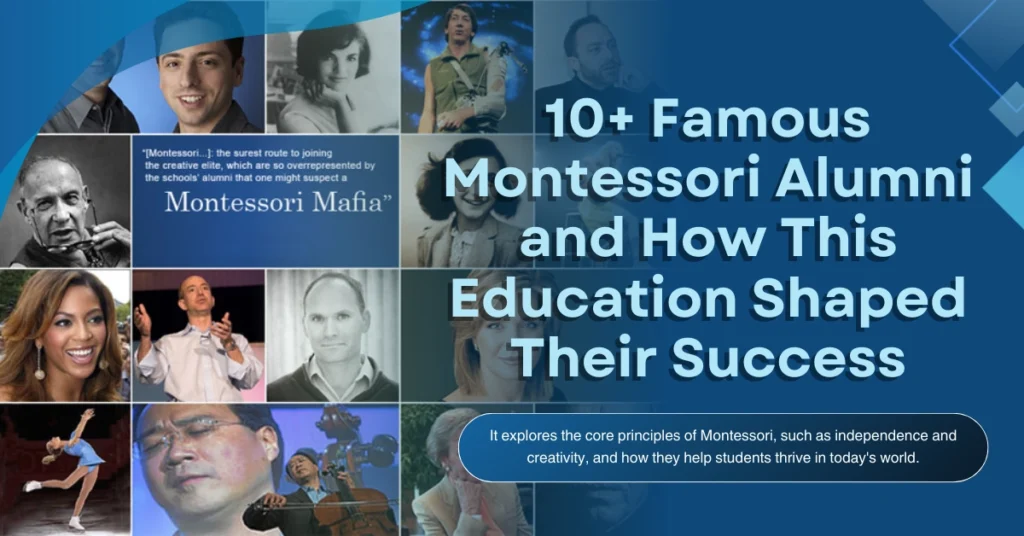Introduction
In today’s fast-paced world, we often look at the remarkable achievements of global leaders, innovators, and creatives, wondering what drives their success. Behind some of the most influential figures across industries—business, politics, entertainment, technology, and beyond—lies a common thread: their education. Famous Montessori alumni, from tech moguls to political leaders, have shown the decisive impact this education system can have on their growth. But how exactly does Montessori shape the minds of those who go on to change the world?
Many face the misunderstanding of what Montessori education truly offers. While this educational method has gained popularity in recent decades, many people still associate it with simply being a different way to teach children. There’s a lack of understanding about its more profound impact on shaping independent thinkers and problem-solvers. After all, how could a system that emphasizes freedom, creativity, and exploration be the foundation for such notable famous Montessori alumni who go on to tackle global challenges? How does Montessori education help develop the leadership skills and innovative mindset these figures need to excel?
The solution lies in exploring how Montessori’s core principles nurture personalized learning, creativity, and independence. By focusing on individual learning styles and offering freedom within a structured environment, Montessori education empowers its students to take control of their learning journey. This is not about limiting structure or guidance but giving students the autonomy to discover and create solutions and develop a deep sense of responsibility for their learning. Famous Montessori alumni, like Sergey Brin, Richard Branson, and Malala Yousafzai, have benefited from this approach, revolutionizing the business world, breaking political barriers, and advocating for equality. These Montessori principles prepare students for academic success and shape them into creative, resilient leaders who can impact society meaningfully.
As we explore the stories of these Montessori school alumni, we’ll uncover how Montessori’s emphasis on critical thinking, self-reliance, and leadership has paved the way for them to become global change-makers. From Silicon Valley entrepreneurs to Nobel Peace Prize laureates, the success of famous Montessori alumni for their achievements demonstrates that this educational system plays a critical role in developing the next generation of leaders.
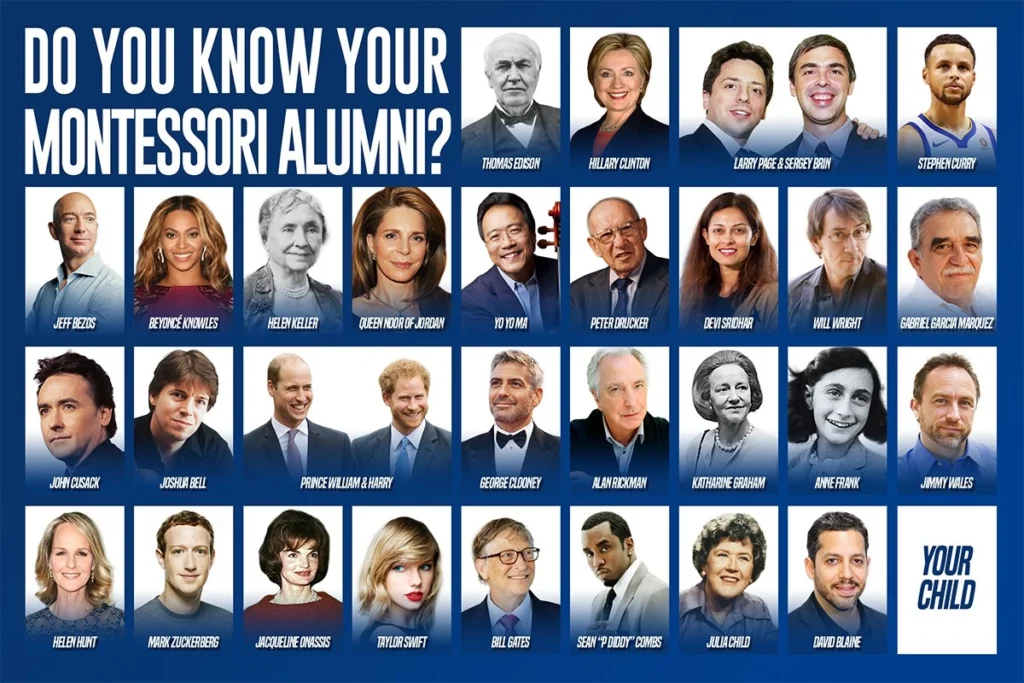
Brief to Montessori Education
Montessori education is a teaching method and a holistic philosophy that nurtures children into independent, responsible, and curious learners. Founded by Dr. Maria Montessori in the early 1900s, this system breaks away from the traditional one-size-fits-all approach to learning. Instead, it emphasizes individualized education, where children can explore at their own pace and pursue their interests. Unlike the conventional classroom, where students sit passively and absorb information, Montessori classrooms are dynamic and interactive. The environment encourages exploration, creativity, and independent thought, allowing children to lead their learning journeys.
At the heart of Montessori education is the belief that children are naturally curious and capable of learning. Instead of teachers directing every aspect of a child’s day, they are seen as “guides” who facilitate learning by providing the tools, support, and environment necessary for the child to grow. Teachers observe each child’s progress, offering guidance where essential but allowing them to make decisions and learn from their experiences. This approach fosters independence and confidence as students become responsible for their actions and learning. By encouraging children to solve problems independently and interact with peers, Montessori schools prepare them for challenges inside and outside the classroom.
The Montessori approach also helps develop a love of learning that lasts a lifetime. Children are not simply memorizing facts or adhering to a rigid curriculum. They are immersed in an environment where curiosity is celebrated, and learning is seen as a continuous, exciting journey. Whether working on a hands-on math activity, exploring a science experiment, or engaging in group discussions, students are actively involved in the learning process. The famous Montessori alumni from this system often cite the freedom and self-motivation they experienced as children as key factors in their later success, whether in business, politics, arts, or science.
Montessori Education and Personalized Growth
One of the most profound benefits of Montessori education is the emphasis on personalized learning. In traditional education systems, all children are expected to follow the same curriculum, often at the same pace, regardless of their strengths, challenges, or interests. Montessori education challenges this model by allowing each child to learn at their speed. This approach ensures that every student has the time and space to fully understand the material before moving on to the next challenge. Catering to each child’s needs, Montessori classrooms help students build a solid understanding of the subject matter and develop a deeper connection to their learning.
Independence is another cornerstone of Montessori education. Students are free to choose their activities and manage their time, which teaches them to be self-reliant and responsible for their actions. Children in Montessori schools are encouraged to make decisions and solve problems independently from an early age. Whether deciding which activity to work on or how to approach a problem in a group setting, this independence fosters critical thinking and decision-making skills. These skills are invaluable later in life when students transition into adulthood and take on leadership roles in their personal and professional lives.
Alongside independence, Montessori education nurtures creativity and problem-solving. Children can experiment, create, and explore in ways that foster original thinking. The Montessori classroom contains materials designed to engage children’s minds and hands, encouraging them to build, explore, and test their ideas. Whether it’s through art, science projects, or collaborative group work, Montessori students learn how to approach challenges with creativity and resourcefulness. These experiences, designed to inspire imaginative thinking, help students develop a strong sense of self-confidence. Over time, this builds resilience as children learn that it’s okay to make and learn from mistakes. The creativity fostered in Montessori schools lays a strong foundation for famous Montessori alumni who become leaders and innovators. For example, in the tech world, Sergey Brin and Larry Page, the co-founders of Google, have credited their Montessori education for developing their creativity and problem-solving skills, which were instrumental in the creation of one of the most influential companies in the world.
In addition to creativity, the Montessori method promotes collaboration and community-building. Although students are encouraged to work independently, they are also given plenty of opportunities to interact with their peers. Group activities, discussions, and collaborative projects help develop strong social skills and emotional intelligence. Students learn how to communicate effectively, resolve conflicts, and work as a team by working together. These skills are essential for success in any field, as they are directly linked to leadership and interpersonal relationships. As students grow, they develop a deep sense of empathy and responsibility, qualities that are often seen in notable famous Montessori alumni who become advocates for change and social justice.

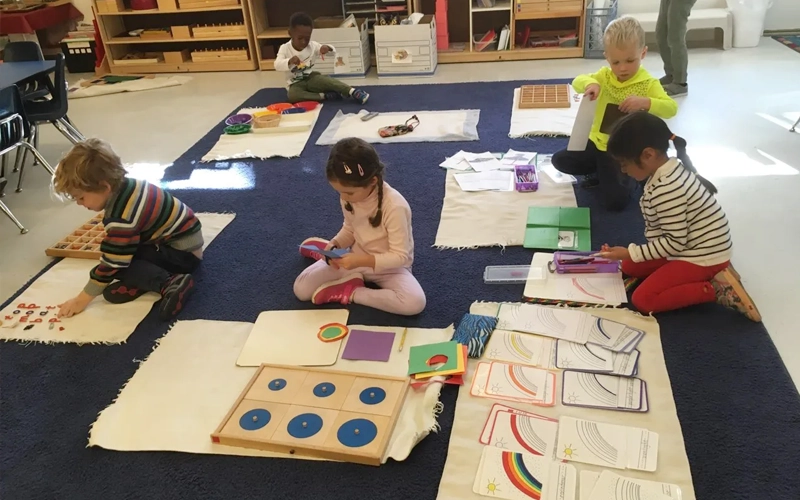

Famous Montessori Alumni and How Montessori Education Shaped These Celebrities
Montessori education has a long history of producing individuals who excel in various fields thanks to its unique approach to fostering independence, creativity, and critical thinking. Through the Montessori system, children are encouraged to follow their passions, explore at their own pace, and become independent learners. This results in academic success and shapes individuals who can lead and innovate. Many famous Montessori alumni have made significant contributions in business, politics, entertainment, and beyond. Let’s explore how Montessori education helped shape some of the world’s most influential figures.

Theresa May and Montessori Education
Theresa May, the former Prime Minister of the United Kingdom, is an excellent example of how Montessori education shapes leaders. May attended a Montessori school during her early childhood, and the principles of self-reliance and independence she developed there played a significant role in her political career. Throughout her time in office, she demonstrated strong decision-making skills and a deep sense of responsibility—qualities nurtured in Montessori classrooms. The environment she was exposed to as a young student encouraged her to think critically and stand firm in her beliefs, even when faced with challenges. Her leadership style reflects the self-confidence and problem-solving abilities cultivated in Montessori education.
Indira Gandhi and Montessori Education
Indira Gandhi, India’s first female Prime Minister, is another notable Montessori alum who benefited from this unique educational approach. Gandhi attended a Montessori school in the early stages of her education, where she developed the foundation of independence and leadership that would define her political career. Montessori schools encourage children to explore and question the world around them, and Gandhi’s education was no different. She carried these values into adulthood, using them to navigate the complex world of politics. Her leadership success can be partly attributed to the sense of self-reliance and confidence she developed in Montessori classrooms.
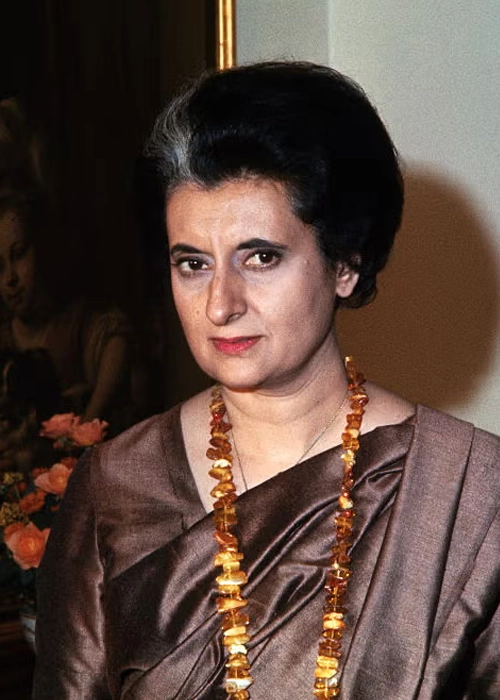

Anne Frank and Montessori Education
The story of Anne Frank, one of the most influential voices in history, is deeply intertwined with Montessori education. Anne Frank, best known for her diary, which gives a poignant account of her life during the Holocaust, attended a Montessori school in her early years. Her experiences in a Montessori environment helped shape her strong sense of individuality and her ability to express her thoughts and feelings with great depth and honesty. Montessori education encourages self-expression and emotional development, reflecting these principles in Anne’s writing. Her courage and ability to reflect on her circumstances with maturity and clarity were nurtured during her early education.
Monica Bellucci and Montessori Education
Monica Bellucci, a renowned actress and model, is another Montessori alum who credits her education for shaping her approach to life and her career. Bellucci attended a Montessori school during her childhood, and the education system encouraged her to think independently and embrace her creative abilities. Montessori education’s emphasis on creativity and individuality helped her develop the confidence to pursue a career in acting, where she became an international icon. Her success in a competitive industry is a testament to the independence and resilience Montessori education fosters in its students.


Sergey Brin & Larry Page: The Founders of Google
One of the most famous stories of famous Montessori alumni who went on to achieve incredible success is that of Sergey Brin and Larry Page, the co-founders of Google. Both Brin and Page attended Montessori schools as children, and the impact of Montessori education is evident in their approach to innovation. Critical thinking, problem-solving, and independent learning are all core components of the Montessori method, and these are traits that Brin and Page carried with them into their careers. They created Google, a platform that revolutionized the internet by constantly challenging the norms and thinking outside the box—precisely what Montessori encourages. The ability to question the status quo and develop new ideas, nurtured in their early education, became a key factor in their success.
Katherine Graham and Montessori Education
Katherine Graham, the first female CEO of a major American newspaper (The Washington Post), also benefited from Montessori education. Her ability to lead with courage and integrity in facing challenges reflects the independence and resilience developed in Montessori classrooms. Montessori education strongly emphasizes critical thinking, which helped Graham navigate the complexities of running a large media company during turbulent times, including overseeing the Washington Post’s coverage of the Watergate scandal. Her success in a male-dominated industry is a testament to the self-confidence and leadership skills nurtured in her Montessori upbringing.
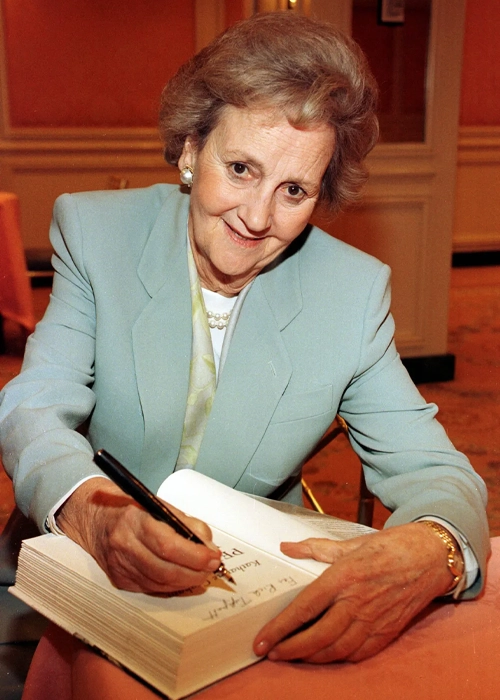
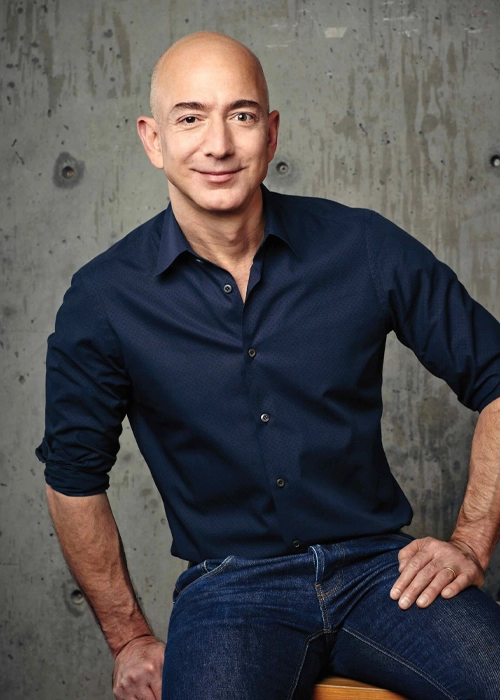
Jeff Bezos and Montessori Education
Jeff Bezos, the founder of Amazon and one of the wealthiest people in the world, is another example of how Montessori education shapes innovative thinkers. Bezos attended a Montessori school during childhood, where he was encouraged to be curious, explore, and solve problems independently. This fostered his entrepreneurial spirit and innovative mindset, which were critical in creating Amazon. From an early age, Bezos was taught to think outside the box and pursue his passions, a mindset that helped him build Amazon from a small online bookstore into the global e-commerce giant it is today. The freedom to explore and think independently, central tenets of Montessori education, shaped how Bezos approached business and innovation.
Jimmy Wales and Montessori Education
Jimmy Wales, co-founder of Wikipedia, is another powerful example of how Montessori education shaped an individual destined to make a global impact. Growing up in a Montessori school, Wales was encouraged to think independently and approach problems creatively. These early experiences shaped his entrepreneurial journey and his ability to think critically about the role of information in society. Wales’s focus on providing free access to knowledge through Wikipedia reflects the core Montessori principles of independence and self-directed learning, as he created a platform where people could freely contribute and access information. Montessori education helped Wales build the confidence and critical thinking skills necessary to make one of the world’s largest and most used websites. His story highlights how famous Montessori alumni are often driven by the desire to contribute meaningfully to society.
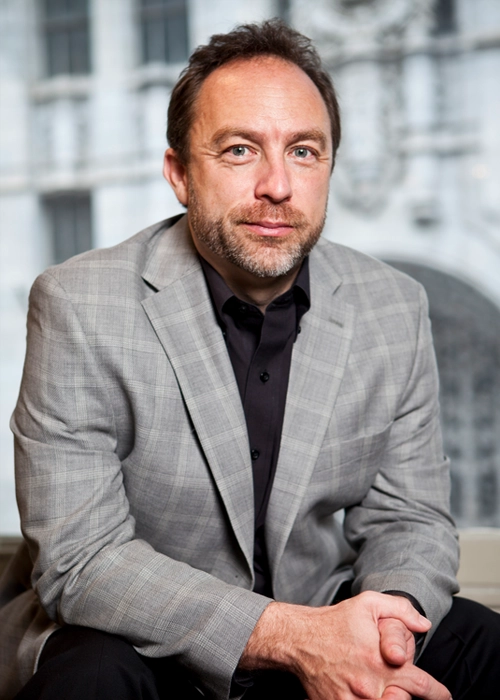

Richard Branson and Montessori Education
Richard Branson, the founder of the Virgin Group, credits his Montessori education for instilling in him the independence and adventurous spirit that drove him to launch various successful business ventures. Montessori schools focus on developing a child’s ability to make decisions and take responsibility for their actions, and Branson’s early education in a Montessori setting helped cultivate these qualities. In the business world, where risk-taking and creativity are key, Branson thrived because of the confidence in his abilities nurtured in his Montessori years. The free, hands-on environment he experienced in Montessori classrooms encouraged him to think outside the box and embrace new ideas. This mindset was instrumental in the success of Virgin Group and its diverse business endeavors. Branson’s success story exemplifies how the creativity and self-confidence fostered in Montessori schools can lead to groundbreaking achievements in business.
Salma Hayek and Montessori Education
Salma Hayek, the internationally acclaimed actress and activist, is another Montessori alum whose success is rooted in the principles of Montessori education. Growing up in a Montessori school, Hayek learned to value creativity, independence, and self-expression. Montessori education encourages children to express their ideas and explore their creativity in a safe, supportive environment, which is precisely what Hayek experienced. Her ability to express herself and think independently in her acting career and activism reflects Montessori values. From playing complex roles in films to advocating for gender equality and rights for marginalized communities, Hayek embodies the self-confidence and creativity that Montessori schools aim to instill in their students. Her success in Hollywood and beyond can be traced to the foundational skills she developed during her Montessori years.
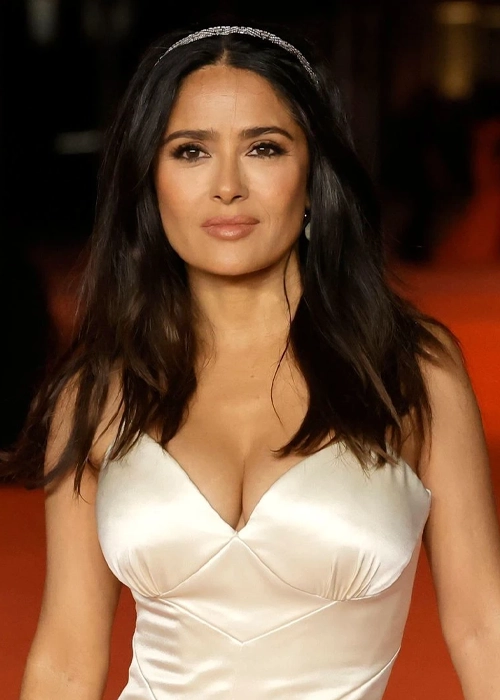
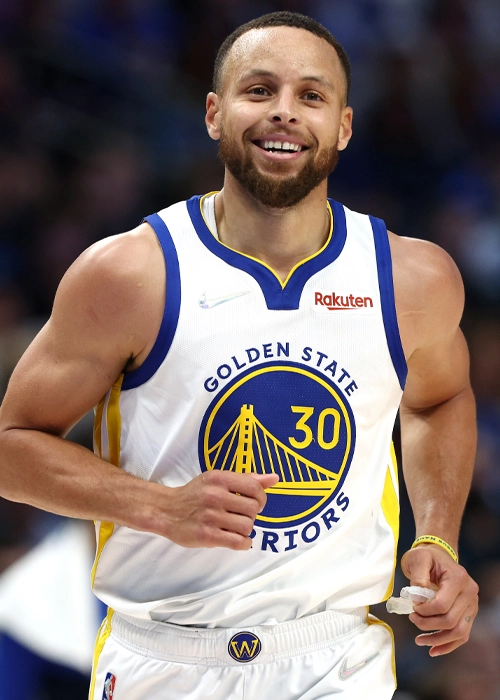
Stephen Curry and Montessori Education
Stephen Curry, one of his generation’s most talented and influential basketball players, is another famous Montessori alum who attributes his success to his early education. Known for his exceptional shooting ability and leadership on the court, Curry’s skills directly reflect the independence and self-discipline that Montessori education instills. In a Montessori classroom, students are taught to set their own goals, develop strategies for achieving them, and hold themselves accountable—skills critical in any sport, especially basketball. Curry’s Montessori upbringing helped him build the mental resilience and critical thinking skills that enabled him to rise to the top of the NBA. His ability to lead his team and maintain focus during high-pressure situations is a testament to his independence and confidence as a young student in a Montessori school.
Julia Child and Montessori Education
Julia Child, the legendary chef and television personality, also benefited from a Montessori education that helped shape her creativity and passion for learning. Montessori education encourages students to experiment, explore, and develop their unique talents—principles that Child embraced as she moved forward in her culinary career. The child’s success as a chef and author reflects the independence and confidence Montessori education instilled in her. Montessori students are taught to approach challenges with curiosity and resilience, and Child’s ability to master the art of French cooking, write cookbooks, and entertain millions on television speaks to the kind of self-confidence and creativity that Montessori nurtures in its students. Her journey highlights how Montessori education can spark lifelong passion and lead to success in even the most competitive industries.
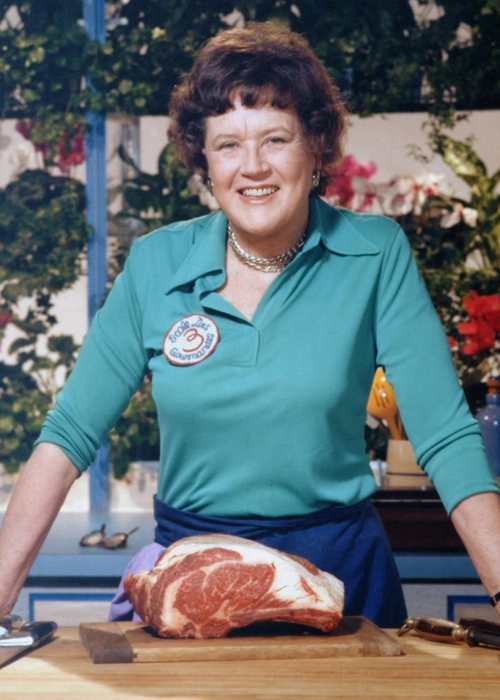
The stories of these famous Montessori alumni—from business moguls to political leaders and artists—illustrate the lasting impact that Montessori education has on its students. Montessori schools emphasize self-reliance, critical thinking, and creativity, which are values crucial for success in both personal and professional life. These traits are essential for achieving academic success and are foundational for becoming leaders and innovators who can change the world.
Each figure—whether Sergey Brin and Larry Page, Richard Branson, or Salma Hayek—has shown how Montessori education fosters independence, creativity, and a love for learning, which plays a key role in shaping them into the influential individuals they are today. Montessori education equips students with the tools they need to succeed in the ever-evolving world by focusing on personalized learning and encouraging children to think for themselves.
As we’ve seen from the success stories of these Montessori school alumni, the principles they learned early in life continue to serve them throughout their careers, helping them innovate, lead, and break barriers in their respective fields. The impact of Montessori education is undeniable—it shapes not only the academic success of students but also their character and approach to the world. For these famous Montessori alumni, their early education was the key to becoming the visionaries, leaders, and changemakers they are today.
Core Impact of Montessori Education
Montessori education has a profound and lasting impact on the students it serves. It’s not just about what children learn academically but how they develop. Famous Montessori alumni often attribute their success to the unique way Montessori schools prepare students for life beyond the classroom. Here’s a closer look at how Montessori education fosters growth:
Key Aspects of Montessori Education’s Impact:
- Personalized Learning:
- Montessori education is inherently individualized. Every child can learn at their own pace, ensuring they truly understand and engage with the material before moving on. This personalized approach helps students develop a deep connection to their study subjects.
- This starkly contrasts traditional education, where the pace is typically set for the entire class, sometimes leaving some students behind or causing others to become bored.
- Independence:
- One of Montessori’s most significant impacts is its ability to foster independence in children. Students are free to make choices in their learning, whether picking the activity they want to work on or determining how to solve a problem.
- Montessori schools help children become self-reliant and confident in their abilities by allowing them to take charge of their learning. This independence isn’t just academic; it extends to life skills, preparing children for success in their future careers and personal lives.
- Critical Thinking:
- Montessori education encourages critical thinking from an early age. Children are encouraged to question, explore, and solve problems independently. Teachers don’t provide all the answers; instead, they ask open-ended questions that make children think deeply.
- This emphasis on thinking critically allows students to approach problems logically and creatively, a skill they can use throughout their lives.
- Creativity and Innovation:
- Creativity is another key component of Montessori education. Students are encouraged to use their imagination to create, experiment, and innovate. The classroom environment is rich with materials that stimulate creative thinking, allowing children to engage with subjects in new and exciting ways.
- Famous Montessori alumni who are innovators in their fields often point to their early education as a foundation for their ability to think outside the box and challenge the status quo. Creativity is encouraged in artistic subjects and across all areas of learning.
- Hands-on Learning:
- Montessori education emphasizes the importance of hands-on learning. Children work with tangible materials, learning concepts through experience rather than just reading about them. This type of learning engages their senses and helps them retain knowledge meaningfully.
- Whether building a structure in math class, exploring scientific principles with physical models, or practicing new language skills through real-world activities, hands-on learning makes the educational experience more prosperous and more immersive.
- Social and Emotional Growth:
- In addition to academic development, Montessori education focuses heavily on social and emotional growth. Students are encouraged to collaborate, work in teams, and help each other, which fosters a strong sense of community and mutual respect.
- The emotional intelligence gained from these experiences helps famous Montessori alumni navigate complex interpersonal dynamics and become compassionate leaders and team players in their careers.
The Lasting Effects of Montessori on Alumni:
Many famous Montessori alumni recall how their education prepared them for success in the real world by cultivating qualities like confidence, innovation, and problem-solving. These skills are valuable for academics and essential for leadership, entrepreneurship, and success in any field. The critical thinking and independence learned in Montessori classrooms make individuals more likely to succeed in high-pressure situations, manage teams effectively, and drive change in their communities.
For example, Sergey Brin and Larry Page attribute much of their success in founding Google to their Montessori education, encouraging them to challenge norms, think critically, and foster creativity. These traits allowed them to create one of the world’s most innovative and influential tech companies. The core impact of Montessori education is far-reaching, extending beyond the classroom to shape successful careers and lives.
Montessori vs. Traditional Education
While both Montessori and traditional education aim to educate children, their methods and outcomes are vastly different. Here’s a detailed comparison of how each system works and the long-term effects on students.
| Aspect | تعليم مونتيسوري | Traditional Education |
|---|---|---|
| Learning Style | Child-centered: Focuses on each child’s interests and pace. | Teacher-centered: Focuses on standardized instruction for the class. |
| Classroom Environment | Flexible, designed for exploration and independent work. | Rigid, with fixed desks and teacher-led instruction. |
| Role of Teacher | Child-centered: Focuses on each child’s interests and pace. | Instructor/Authority: Teachers deliver lectures and dictate learning. |
| Focus on Independence | Textbooks and worksheets are often passive learning. | The focus is limited to independence, and students follow directions. |
| Learning Materials | Hands-on, interactive materials that engage the senses. | The entire class follows the same pace and schedule. |
| Pace of Learning | Each student moves at their own pace, focusing on understanding. | Entire class follows the same pace and schedule. |
| Creativity and Innovation | Encouraged through open-ended activities and problem-solving. | Limited, often focused on structured learning and memorization. |
| Social Development | Encourages collaboration, emotional intelligence, and social skills. | Social skills are learned but often through teacher-led activities. |
Key Differences Explained:
- Personalized vs. One-Size-Fits-All:
- In Montessori education, learning is tailored to each child’s pace and interests. This allows for personalized growth and encourages students to develop skills in areas they are passionate about. In contrast, traditional education often follows a set curriculum with standardized exams, which may not cater to every child’s unique needs.
- Independence vs. Teacher Dependence:
- Montessori education fosters independence, with students making decisions and taking responsibility for their learning. On the other hand, traditional education relies heavily on the teacher’s authority and guidance, which may limit the development of self-reliance.
- Creative Learning vs. Rote Learning:
- Montessori encourages students to engage creatively with learning materials, promoting critical thinking and innovation. In traditional classrooms, students often focus on memorization and following instructions, leaving less room for creative problem-solving.
- Hands-on Learning vs. Passive Learning:
- Montessori students are immersed in hands-on learning experiences, which make learning more tangible and memorable. Traditional education often uses textbooks and lectures, which can make learning less interactive.
- Social Development:
- Montessori classrooms prioritize emotional and social development, with students working together, helping each other, and building communication skills. In contrast, traditional classrooms may focus more on academic performance than on teaching social skills and emotional growth.
The comparison between Montessori education and traditional education highlights the benefits of a system that nurtures independence, critical thinking, and creativity. As we’ve seen from the success of famous Montessori alumni, the impact of Montessori education extends far beyond academic achievement. It shapes students into self-motivated, confident, and innovative individuals capable of leading, problem-solving, and excelling in various fields. Whether in technology, business, politics, or the arts, famous Montessori alumni have proven that this unique educational approach produces the leaders of tomorrow.
Montessori Education in Modern Society
In today’s rapidly changing world, Montessori education is becoming more relevant than ever. With a focus on independent learning, critical thinking, and creativity, Montessori schools are equipped to meet the demands of modern society. Traditional education systems are often based on rigid structures and standardized testing, while Montessori schools encourage children to learn through hands-on experiences and exploration. This method helps students excel academically and become well-rounded individuals capable of navigating complex social and technological landscapes.
As we move into the 21st century, the world faces unprecedented challenges, from technological advancements to social and environmental issues. In this context, Montessori education uniquely prepares children to think critically, solve problems, and confidently lead. By promoting self-directed learning, Montessori schools empower students to take charge of their education and become lifelong learners. This is particularly important in an era where adapting to new technologies and ways of thinking is crucial. Famous Montessori alumni, such as Sergey Brin, Larry Page, and Jeff Bezos, have shown how Montessori education nurtures the skills essential for success today.
Montessori education is not only about academic achievement but also about personal growth and developing a growth mindset. Students learn to collaborate, think critically, and manage their time. These skills are vital as they transition into adulthood and enter the workforce. Famous Montessori alumni have repeatedly proven that this approach produces individuals capable of leading, innovating, and making a difference in the world. Whether in business, politics, or the arts, Montessori education helps students build a strong foundation for success in any field.
Why Montessori Education is Important Today:
- Self-Directed Learning: Montessori encourages students to take responsibility for their learning, a vital skill in today’s world of constantly changing information.
- Creativity and Innovation: Montessori classrooms foster creativity and problem-solving skills using hands-on materials and open-ended activities, encouraging students to think creatively.
- Independence: Montessori students develop independence early on, preparing them for leadership roles in the future.
- Collaboration: In a Montessori setting, students learn how to work together, communicate effectively, and support each other, which are crucial skills in the modern workplace.
- Adaptability: Montessori education prepares students to face the challenges of a rapidly changing world, helping them become lifelong learners who can thrive in any environment.
Montessori in the 21st Century: Application and Challenges
As we look toward the future, Montessori education continues to be a powerful tool for shaping tomorrow’s leaders. However, like any educational approach, it faces unique challenges in the 21st century. The rise of digital learning, the increasing importance of technology, and the need for standardized assessments all present hurdles for Montessori schools to overcome.
One of the main challenges for Montessori education today is adapting its principles to fit within a world increasingly driven by technology. While Montessori has always focused on hands-on learning, modern education systems heavily emphasize digital tools and resources. Montessori schools must find ways to integrate technology to enhance the learning experience rather than detract from the personalized, self-directed approach central to Montessori teaching. However, famous Montessori alumni have shown that the values of Montessori—such as independence, creativity, and critical thinking—are more relevant than ever, even in today’s tech-driven world.
Another challenge is the growing pressure for standardized testing and academic performance metrics, often dominating traditional education systems. Montessori education, on the other hand, focuses on holistic development and personalized learning rather than preparing students for exams. As more parents and educators demand results from education systems, Montessori schools must continue proving that their approach leads to academic and life success.
Additionally, while Montessori education emphasizes individual learning, there is an increasing need for global collaboration and understanding. As the world becomes more interconnected, students must be equipped with the skills to work across cultural and national boundaries. Montessori education can provide the foundation for this by promoting collaboration, empathy, and global awareness, but it will need to evolve to meet the challenges of a more globalized society.
How Montessori Education Can Adapt:
- Embrace Technology: While maintaining its core principles, Montessori schools can integrate technology to enhance personalized learning and prepare students for a tech-driven world.
- Focus on Real-World Skills: Montessori education can place greater emphasis on skills that are critical in the modern world, such as digital literacy, communication, and collaboration.
- Prepare Students for Global Citizenship: As the world becomes more interconnected, Montessori schools can incorporate more global perspectives into their curricula, promoting cultural understanding and global awareness.
- Balance with Standardized Metrics: Montessori schools can find ways to demonstrate their students’ success through alternative assessment methods that highlight the creativity, problem-solving, and leadership skills fostered through Montessori education.
Montessori education has proven to be a powerful force in shaping independent, creative, and confident individuals who can succeed in today’s rapidly changing world. As we move into the 21st century, Montessori schools face the challenge of adapting to new technological advancements and societal demands. However, the core principles of Montessori education, including self-directed learning, critical thinking, and creativity, remain as relevant as ever.
The challenge for Montessori education is to continue evolving while maintaining its commitment to nurturing well-rounded, independent learners. As famous Montessori alumni demonstrate, the skills learned in Montessori classrooms—independence, problem-solving, and collaboration—prepare students to excel in the modern workplace and as leaders of tomorrow. Montessori education will continue to shape the future by providing students with the tools they need to face the challenges of the 21st century and thrive in an ever-changing world.
خاتمة
In conclusion, Montessori education continues to stand as a transformative approach to learning, shaping individuals who are academically successful and equipped with the independence, creativity, and critical thinking skills necessary to thrive in the 21st century. The lasting impact of Montessori education is evident in the many famous Montessori alumni who have become leaders, innovators, and pioneers in various fields. From Sergey Brin and Larry Page in the tech industry to Richard Branson in business and Salma Hayek in entertainment, Montessori education has provided these individuals with a foundation of self-confidence, problem-solving, and creative thinking that has propelled them to greatness.
As we look toward the future, the principles of Montessori education remain incredibly relevant. While it faces challenges in adapting to new technological advancements and societal demands, its core values—self-directed learning, personalized growth, and holistic development—will continue to shape the next generation of leaders. Famous Montessori alumni, equipped with the skills to think independently, innovate, and collaborate, are poised to address the complex challenges of tomorrow’s world.
Ultimately, Montessori education’s power lies in its ability to adapt and evolve while staying true to its roots. In a rapidly changing world, thinking critically, embracing creativity, and acting independently is more critical than ever. Montessori education provides the tools to cultivate these skills, ensuring that its alumni are prepared for academic success, lifelong achievement, and meaningful contributions to society.
